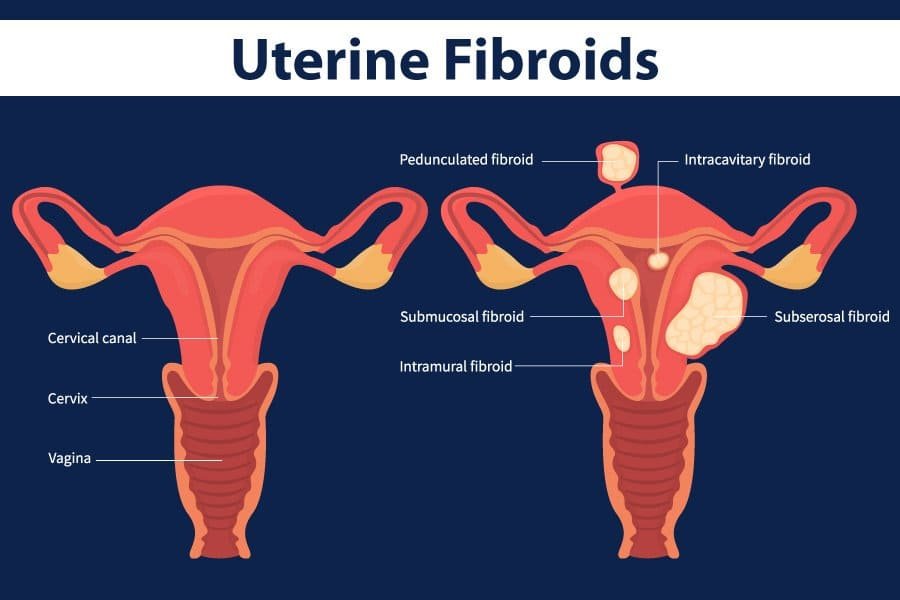
What are fibroids?
Fibroids are benign growths of muscle on the uterus. We don’t know why they develop but we do know they are more common in Black women and usually appear during the reproductive years—in the 30s. While a woman continues to have menses, fibroids may grow. Unfortunately, fibroids don’t usually go away on their own, but typically, after menopause, they get smaller and become less bothersome.
How are fibroids diagnosed?
Fibroids may be identified incidentally during an exam, or during investigations for complaints about pain or periods. If this diagnosis is suspected, an ultrasound is usually performed for confirmation. Sometimes, additional imaging may be needed if the ultrasound is unclear.
What are the symptoms of fibroids?
While many fibroids are asymptomatic, depending on their size and location within the uterus, they can cause bleeding, pain, or pressure symptoms.
Fibroids deeper in the uterus can cause heavy or prolonged menstrual bleeding. Often, the bleeding is heavy enough that pain is associated with it, although this is not always true. In some instances, bleeding can become heavy enough to cause anaemia or a low blood count. Anaemia can cause many symptoms, including, weakness, dizziness, loss of consciousness, or need for blood transfusions.
Fibroids, especially when large, can press on other organs nearby, like the bladder, rectum, or vagina. The symptoms resulting from this pressure are called bulk symptoms. Bulk symptoms can include difficulty with urinating or having bowel movements, pain with sex, and pelvic pressure or pain, sometimes even without bleeding. If the fibroids grow large enough, they can cause the stomach to look visibly larger, and they may even be palpable.
How are fibroids managed or treated?
Management of fibroids depends on the symptoms they cause. If a patient is having no problems, frequently, no intervention is indicated. Based on the situation, a decision would be made about how frequently they should be monitored, if at all.
Certain medications, like hormonal birth control, progesterone pills, or non-hormonal medications, can be very effective for control of abnormal bleeding. They can often also help with painful periods. Pain medications may be used as needed for pain during or between menses. Other bulk symptoms, however, like painful sex or difficulty urinating, often do not respond to medication. In settings where medication is inadequate for symptom management, surgery may be required.
There are other procedures that can help with fibroid related symptoms. One such treatment is uterine artery embolization. In this procedure, the blood flow to the fibroid is blocked, allowing the fibroid to shrink. This is a specialized procedure that is not available everywhere but can be very helpful.
What surgeries are available for the treatment of fibroids?
When medications are not able to adequately control fibroid-related symptoms, surgery is often the next option considered. There are two major surgeries used to treat fibroids.
A hysterectomy is a procedure where the uterus (or womb) is completely removed. When a hysterectomy is performed, a woman will no longer have periods or be able to get pregnant. Depending on the circumstances, her ovaries may or may not be removed at the time of hysterectomy. If ovaries are removed, menopausal symptoms may follow.
For women who desire pregnancy, a myomectomy may be a better choice. A myomectomy is a procedure where the fibroids are cut out of the uterus, but the uterus is not removed. This allows a woman to potentially get pregnant. Her periods will continue, although they may be improved if the fibroids were affecting them. Because her uterus is still in place, new fibroids may grow. Additionally, depending on the extent of the surgery, labour may not be deemed safe and she may need Cesarean sections for delivery in the future.
How do fibroids affect pregnancy?
For most people, fibroids cause no problems with pregnancy or conception. If they do cause complications, these are usually driven by their size and or location.
Occasionally, fibroids can make it more difficult to become pregnant. During pregnancy, fibroids frequently grow. As they get larger, they can cause pain. This is usually a sign of relatively decreased blood flow to the fibroid and, while it causes discomfort to the mother, is usually not a sign of risk to the baby. Pain is the most common symptom associated with fibroids in pregnancy. Certain fibroids can also cause miscarriage, growth restriction (i.e. babies being born small), or preterm labour and birth. If fibroids are very large and located deep in the uterus, they can sometimes make it difficult for babies to get into the right position for vaginal delivery or can block the passage out of the uterus, leading to a need for delivery by Cesarean section.
If you have fibroids, your gynaecologist can help you determine the best management plan for your situation. If surgery is needed, we at RSS are pleased to provide a safe and friendly environment for your surgical needs. If you don’t have a gynaecologist.


